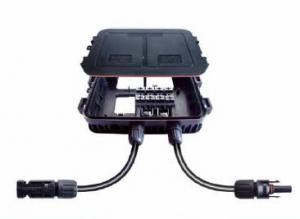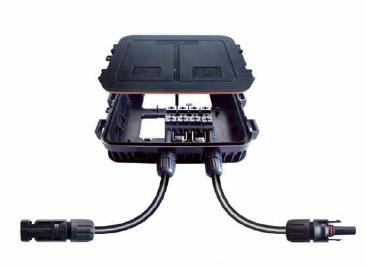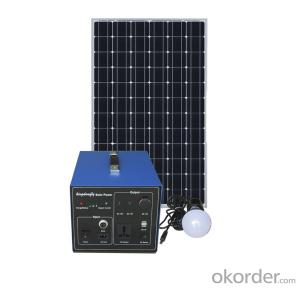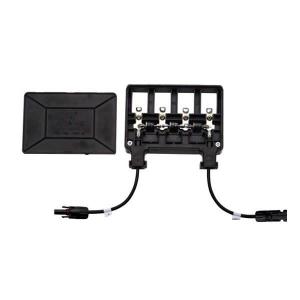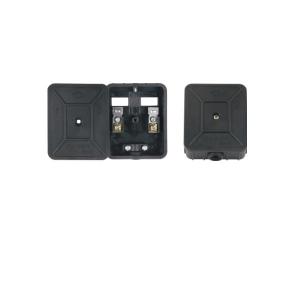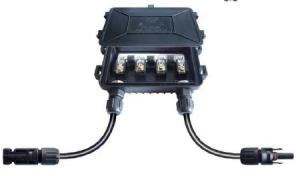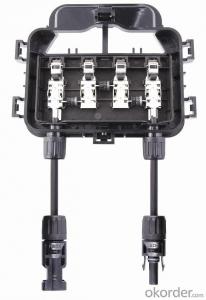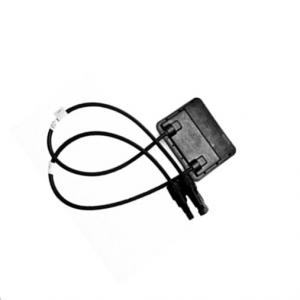Solar Junction box PV-JB003 ST01
- Loading Port:
- China Main Port
- Payment Terms:
- TT OR LC
- Min Order Qty:
- -
- Supply Capability:
- 10000 set/month
OKorder Service Pledge
OKorder Financial Service
You Might Also Like
PV-Junction box,Due to highly robustness,UV-resistance,the touch protection a high grade connection is guaranteed for many years
PV-Junction box
Rated voltage 1000 V
Rated current 30 A
Contact resistance ≤5mΩ
Dia of pin or socket 3mm /4mm
Protection degree(mated,junction box closed/unmated) IP65/IP2X
Operating temperature -40 C to +85C
Insulation material PPO
Contact material Copper,silver plated
Max.Heat dissipation Assessment should be make after final assembly of junction box
- Q: Can a solar energy system be installed on a roof?
- Yes, a solar energy system can be installed on a roof. In fact, rooftops are one of the most common locations for solar panel installations.
- Q: What is the role of solar energy forecasting in grid integration?
- The role of solar energy forecasting in grid integration is vital for effectively managing the integration of solar power into the electrical grid. Solar energy forecasting provides accurate predictions of solar power generation, enabling grid operators and energy market participants to plan and optimize the operation of the grid. Solar energy is intermittent and variable, as it depends on weather conditions and the position of the sun. Therefore, accurate forecasting of solar power generation helps grid operators to anticipate fluctuations in solar energy supply and plan for potential imbalances between supply and demand. Grid integration of solar energy requires balancing the variability of solar power generation with the overall electricity demand. Solar energy forecasting plays a critical role in this process by providing real-time predictions of solar output, allowing grid operators to adjust other sources of power generation or storage to maintain grid stability. Moreover, solar energy forecasting is essential for the effective utilization of solar power in energy markets. Accurate forecasts enable energy market participants to optimize their trading strategies, determine the optimal dispatch of power generation assets, and manage their portfolio effectively. This helps to reduce the cost of integrating solar energy into the grid and enhances the overall economics of renewable energy. Additionally, solar energy forecasting contributes to the efficient operation of grid infrastructure. By providing accurate predictions of solar power generation, grid operators can plan the deployment and operation of transmission and distribution infrastructure, ensuring that it can handle the increasing penetration of solar energy without compromising grid reliability. Overall, solar energy forecasting plays a crucial role in grid integration by providing accurate predictions of solar power generation, allowing grid operators and energy market participants to effectively manage the integration of solar energy into the electrical grid, optimize energy trading strategies, maintain grid stability, and efficiently operate grid infrastructure.
- Q: How do solar energy systems contribute to reducing the risk of electrical fires compared to traditional power generation methods?
- Solar energy systems contribute to reducing the risk of electrical fires compared to traditional power generation methods in several ways. Firstly, solar panels generate electricity without the need for fuel combustion, eliminating the risk of fire caused by flammable materials. Additionally, solar energy systems typically have fewer electrical components and wiring connections, minimizing the potential for faulty connections or short circuits that can lead to fires. Furthermore, solar energy systems do not require long-distance transmission lines, reducing the chances of power surges or electrical faults that can trigger fires. Overall, the decentralized and clean nature of solar energy greatly reduces the risk of electrical fires, making it a safer alternative to traditional power generation methods.
- Q: How much space do solar panels take up on a roof?
- The amount of space solar panels take up on a roof depends on various factors, such as the size and number of panels, as well as the layout and orientation of the roof. On average, a typical residential solar panel system requires about 100-400 square feet of roof space. However, it's best to consult with a solar professional to assess your specific roof and determine the optimal size and configuration for your solar panel installation.
- Q: Can a solar energy system be installed on a vehicle?
- Yes, a solar energy system can be installed on a vehicle. This is known as a solar-powered vehicle or solar car. These vehicles are designed to harness energy from the sun through solar panels mounted on the roof or other parts of the vehicle. The solar panels convert sunlight into electricity, which can be used to power the vehicle's electric motor or stored in batteries for later use. Solar cars are a sustainable and environmentally friendly alternative to traditional fuel-powered vehicles, as they reduce reliance on fossil fuels and produce zero emissions. While solar cars are still relatively new and not as widely used as traditional vehicles, advancements in technology are making them more efficient and practical for everyday use.
- Q: Are there any noise or vibration issues with solar energy systems?
- No, noise and vibration issues are minimal with solar energy systems as they have no moving parts.
- Q: Can solar energy systems be used in powering swimming pools or spas?
- Certainly, swimming pools or spas can be powered by solar energy systems. Solar pool heating systems harness the sun's energy to warm the water in the pool or spa, presenting a more sustainable and economical option compared to traditional heating methods. Typically, these systems comprise solar collectors, a pump, and a filter. The solar collectors, typically positioned on the roof or ground, absorb sunlight and transfer its warmth to the pool water. The pump circulates the water through the collectors and returns it to the pool, ensuring a continuous flow of heated water. By utilizing a renewable energy source, solar energy systems for swimming pools and spas not only lower energy expenses but also contribute positively to the environment.
- Q: Can solar energy systems be used in areas with limited access to technical expertise?
- Yes, solar energy systems can be used in areas with limited access to technical expertise. The design and installation of solar energy systems have become increasingly user-friendly and accessible over time. There are now simplified and plug-and-play solar kits available that can be easily installed and maintained by individuals with limited technical knowledge. Additionally, organizations and initiatives are providing training and educational resources to empower local communities in these areas to adopt and manage solar energy systems effectively.
- Q: Are there any limitations to the amount of electricity a solar energy system can generate?
- Yes, there are limitations to the amount of electricity a solar energy system can generate. These limitations include factors such as the size and efficiency of the system, the amount of sunlight available, and the geographical location of the system. Additionally, external factors like weather conditions and shading can affect the system's performance and limit its electricity generation.
- Q: What is the maintenance cost of a solar energy system?
- The maintenance cost of a solar energy system can vary due to factors such as system size, component type, and installation location. Solar energy systems generally require minimal maintenance and are considered low maintenance compared to other energy generation methods. Regular maintenance tasks for a solar energy system may involve cleaning the solar panels for optimal performance, inspecting wiring and connections for damage or loose connections, and checking the inverter for proper functioning. These routine maintenance activities can be done by the system owner or a professional technician. The cost of maintaining a solar energy system is typically low. Basic equipment and materials are sufficient for cleaning solar panels, and the frequency of cleaning depends on the level of dust or dirt in the area. Although occasional repairs or component replacements may incur additional costs, these instances are rare, particularly with high-quality solar systems. It is worth noting that many solar energy system manufacturers provide warranties that cover repair or replacement costs for a specified period. Additionally, some system owners opt for service contracts or maintenance plans to ensure regular inspections and upkeep of their systems. In conclusion, while solar energy systems have some maintenance requirements, the associated costs are generally low compared to the long-term benefits and savings from clean and renewable energy generation.
Send your message to us
Solar Junction box PV-JB003 ST01
- Loading Port:
- China Main Port
- Payment Terms:
- TT OR LC
- Min Order Qty:
- -
- Supply Capability:
- 10000 set/month
OKorder Service Pledge
OKorder Financial Service
Similar products
Hot products
Hot Searches
Related keywords
